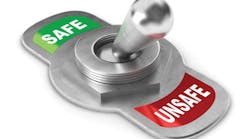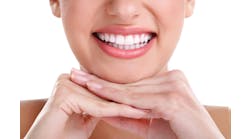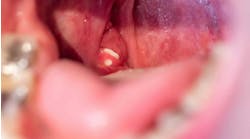In harm's way: Breaches in infection control protocols are baffling, seemingly contrary to our vows
By Lory Laughter, RDH, BS, MS
There aren’t many things in life that baffle me anymore. When you’ve lived over half a century, the uncommon becomes commonplace. I’ve always considered my acceptance of every level of weird as a good thing, even, perhaps, as a bit of maturity showing. I’ll admit I still struggle with the ideas of adults who don’t flush public toilets and people who swim with sharks, but other than that, my head does not shake much. That is, until the recent events regarding dental hygiene programs and private dental offices showed an almost uncaring attitude for patient safety. I do not make this statement lightly and the blame does not lie solely with these entities.
I remember a ceremony around the time of my graduation during which we repeated an oath as new health-care professionals. I don’t remember all the words as it was over 23 years ago, but I distinctly recall a reference to serving the public and making the health needs of the population a top priority. As I am sure most dental professionals, including educators, dentists, and assistants, take a similar oath, it confuses me when information comes to light showing a total disregard for patient safety.
Today I read a rant on social media about a dental office with a nonfunctioning autoclave. The obvious answers to their dilemma appear to be a) cancel patient treatment until the autoclave is repaired and spore tested, or b) use the autoclave of a nearby friendly office and perhaps postpone some patient visits in order to accommodate the break. Instead, the dentist-owner took dirty instruments home and boiled them in a pot on his stovetop for 20 minutes. Many dental hygienists who commented on social media were disgusted and appalled, and rightfully so. Yet, a few were OK with the idea in the short term, although their replies were quickly deleted. Several mentioned an OSHA violation, which it probably is, but more importantly, it should come to the attention of the health department because patient health is at risk.
I realize most dental hygienists need employment and the job market is not bright in every part of the country right now, but where did the promise to protect the public get lost? Why dental hygienists are still showing up for work and participating in such disregard for human safety is beyond me. I’m adding this to my short list of things that still baffle me.
Dental hygiene programs, in my opinion, have no excuse for putting patients’ health at risk. Educational institutions have access to the latest information regarding patient safety, not only in respect to infection control, but also in patient assessment and risk management. The resources are available and educators understand the importance of standards, or so we assume.
In checking only one state regulatory board, I found three documented and substantiated reports of infection control violations in dental hygiene programs. These ranged from reusing disposable nitrous oxide masks to the unthinkable: failing to do spore testing regularly. In one case, spore testing logs were absent for over a 30-day period. One program document showed 21 violations in infection control during a single site visit. There was also no faculty or staff responsible for overseeing sterilization in the program, leaving the burden on students to ensure procedures were followed correctly.
Programs do have the opportunity to learn from site visits and to correct errors. For this reason alone, I will not name any of the institutions cited in the documents that I accessed online or from a regulatory board. Still, I am deeply concerned when students are allowed to progress and graduate without completing a minimum number of clinical competencies, as noted in one document.
Another example in my reading was students providing services at a Veterans Affairs facility off-site from the program clinic. This is an amazing health-care service we can provide while still gaining our education to become licensed professionals. I remember a similar rotation to a Native American medical facility during my initial dental hygiene education. The problem here stems from the fact that no faculty supervised the services provided by the students and, in fact, no faculty was present at the site. The supervising dentist at the facility did not check the treatment provided by students and had not performed an exam on any of the patients in over a year. Patient safety was not considered nor was the ethical responsibility of appropriate care being taught to students, judging from this example. In fact, it was a student letter to the regulatory board stating that no faculty or director visited the site with students that first alerted the board to the concern.
Lest I seem insensitive to students, it does raise concerns about the education these students are receiving and the lack of information they will carry into practice. Students trust programs to provide them with a current and relevant education that prepares them for a career. When students feel the need to report their own programs to a higher authority, the problem is out of control. Students and patients deserve better.
All this brings me back to my original unease - the lapse of concern for patient safety and our promise to protect patients from harm. Dental hygiene programs do not hold all responsibility on this front. If I can access this information with a little web browsing, health departments can find it just as easily. Why were patients, who were seen in a clinic where spore testing was not performed, not contacted? To my knowledge, no health department has contacted any patient who was potentially exposed to alert them to this fact.
When I called one health department and asked why over 300 patients who were potentially exposed to harmful and disease-causing organisms were not contacted, I was told, “No patient has contacted the department to report an illness.” It seems the department only looks into potential exposures after someone becomes ill. I find this unacceptable, as should you.
A public health department employs health-care professionals, and those individuals most likely took an oath or made a pledge similar to the one taken by RDHs that ensures we will protect our patients and the health of the public. We are all held to this standard. No amount of production dollars or number of graduates or the lack of reported illness outweighs the duty to protect those who trust us with their health. Health-care professionals know better and the public deserves more, so let us be the first to ensure we keep our promises. RDH
Lory Laughter, RDH, BS, MS, practices clinically in Napa, Calif. She is an assistant professor of periodontics at University of the Pacific. Her role as an international speaker allows her to combine her love of travel with educating dental professionals. She is a clinical educator for American Eagle Instruments. She can be contacted at [email protected].






